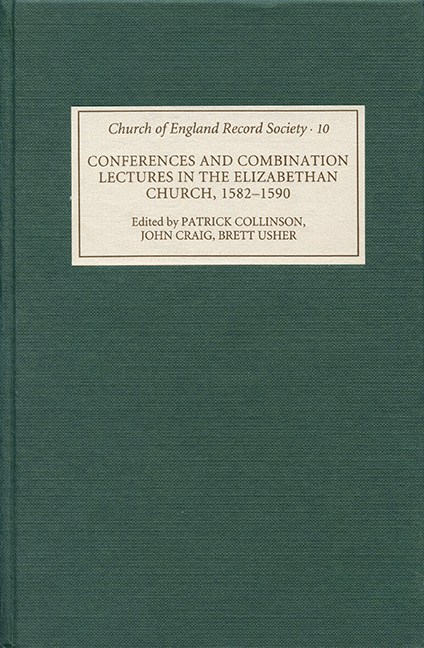Book contents
- Frontmatter
- Contents
- List of illustrations
- Abbreviations
- Dedication
- Preface and acknowledgments
- Introduction
- The Texts
- Biographical Register
- Appendices
- Appendix 1: Dedham grammar school
- Appendix 2: The Dedham lectureship
- Appendix 3: A Sermon preached by Edmund Chapman
- Topical and General Index
- Index of Personal Names
- Index of Place-Names
- Index of Scriptural References
- Index of Classical, Patristic, Medieval and Reformed References
Preface and acknowledgments
Published online by Cambridge University Press: 26 May 2017
- Frontmatter
- Contents
- List of illustrations
- Abbreviations
- Dedication
- Preface and acknowledgments
- Introduction
- The Texts
- Biographical Register
- Appendices
- Appendix 1: Dedham grammar school
- Appendix 2: The Dedham lectureship
- Appendix 3: A Sermon preached by Edmund Chapman
- Topical and General Index
- Index of Personal Names
- Index of Place-Names
- Index of Scriptural References
- Index of Classical, Patristic, Medieval and Reformed References
Summary
This volume is the culmination of a number of preoccupations of its three editors, all of whose research has been intimately bound up with the chequered fortunes of Elizabeth I's ‘but halfly reformed’ church settlement. As a post-graduate student in the 1950s, Patrick Collinson early recognized the need to produce a complete and accurate edition of the text that lies at the heart of this book, now preserved in Manchester as Rylands English MS 874, but did nothing more about it.
The Church of England Record Society came into being many years later, in 1992, the fruit of the vision and creative way with finance of the late Geoffrey Bill, Librarian of Lambeth Palace from 1958 to 1991. With no less panache and after a relentless pursuit of his quarry, Dr Bill restored to Lambeth Palace Library the collection known, because of its archival wanderings, as the Laud-Selden-Fairhurst MSS. These remarkable papers contain much material relating to ‘prophesying’, that unofficial institution of the Elizabethan church which occasioned the downfall of Elizabeth's second archbishop of Canterbury, Edmund Grindal – not only Grindal's correspondence with his bishops on the subject, but also papers connected with his defiance of the queen, his sequestration and his subsequent trial. When Geoffrey Bill created the Church of England Record Society he hoped that this Grindal archive in the Laud-Selden-Fairhurst collection would constitute the first volume in the Society's projected series of publications, and that Collinson would be its editor. Although once again Collinson dragged his feet, the story which these documents have to tell formed the climax of Collinson's biography of Grindal, published in 1979.
Thereafter another founder member of the Church of England Record Society, Brett Usher, suggested that a start be made with Rylands MS 874, the papers of the Dedham conference of ministers – a unique survival from that clandestine world of clerical self-regulation which came into existence in the 1580s, perhaps in equal and opposite reaction to the suppression of the prophesyings. There was support for the idea from the Reverend Gerard Moate, vicar and lecturer of Dedham and a council member of the Record Society. As a Cambridge undergraduate in the 1960s, Usher had been introduced to the complexities of Elizabethan churchmanship by Dr Harry Culverwell Porter, fellow of Selwyn College, Cambridge.
- Type
- Chapter
- Information
- Conferences and Combination Lectures in the Elizabethan Church: Dedham and Bury St Edmunds, 1582–1590 , pp. xiii - xviiiPublisher: Boydell & BrewerPrint publication year: 2003

